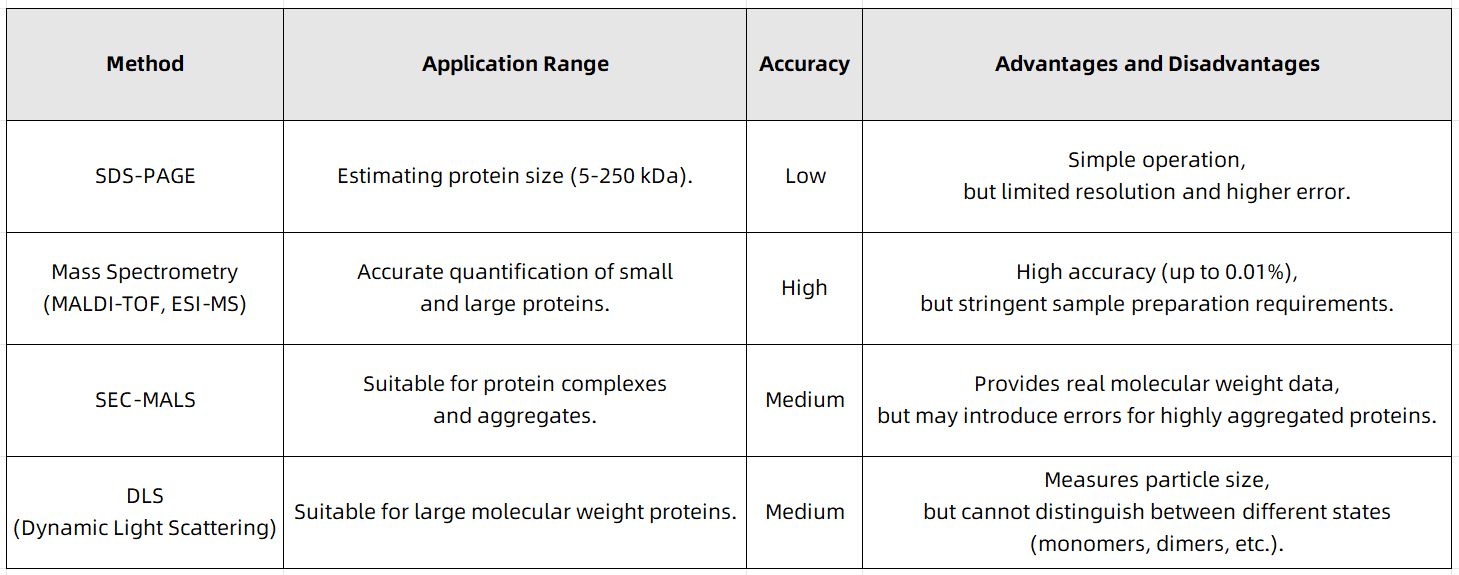The Secret to Accurate Protein Molecular Weight Determination
The key to accurate protein molecular weight determination is a crucial factor in ensuring the success of protein function and structure research. Accurate protein molecular weight determination plays a critical role in fields such as life sciences, drug development, and proteomics. Whether for structural analysis, functional studies, or biomarker discovery, precise molecular weight data is indispensable. However, due to the inherent complexity of proteins, experimental errors frequently arise, leading to data discrepancies or poor reproducibility. So, how can we ensure high-precision protein molecular weight determination? This paper will explore the key factors influencing determination accuracy and propose optimal experimental strategies to assist researchers in obtaining the most reliable data.
Key Factors Influencing the Accuracy of Protein Molecular Weight Determination
Several factors can influence the accuracy of protein molecular weight determination during experiments, including the following:
1. Selection of the Appropriate Measurement Method
Different protein measurement methods are suitable for different protein types, and improper selection may lead to biased results. The common measurement methods and their application ranges are as follows:

Figure 1
2. Sample Purity and Handling
The quality of the protein sample directly affects the accuracy of molecular weight determination. Optimization before the experiment includes the following:
(1) Purity Requirements: Impurities may affect SDS-PAGE band clarity or interfere with mass spectrometry signals. A purity of ≥ 90% is recommended.
(2) Protein Solution Stability: To prevent aggregation or degradation, optimize buffers (e.g., PBS, Tris-HCl) and add stabilizers (e.g., glycerol, DTT) before the experiment.
(3) Sample Concentration Optimization: Different techniques have varying concentration requirements. For instance, MALDI-TOF is suitable for 10-50 μg, and ESI-MS is suitable for 1-10 μM.
3. Calibration of Experimental Errors
(1) Standard Protein Calibration: Use a standard protein with a known molecular weight for calibration to ensure accurate data.
(2) Repetitive Experiments: Conduct at least three replicate experiments to verify result consistency.
(3) Instrument Calibration: Regular maintenance and calibration of instruments, such as mass spectrometers, are essential to ensure sensitivity and resolution.
Optimization Strategies for Different Protein Molecular Weight Determination Methods
1. Minimizing SDS-PAGE Errors
SDS-PAGE is a commonly used method for estimating protein molecular weight, but due to gel electrophoresis limitations, errors are often substantial. Optimization strategies are as follows:
(1) Selecting the Right Gel Concentration: For proteins with molecular weight < 50 kDa, use 12-15% gels; for those > 100 kDa, use 6-8% gels to enhance resolution.
(2) Accurate Sample Loading: Ensure consistent loading (typically 5-20 μg) to avoid unclear bands.
(3) Proper Standard Curve Plotting: Use a logarithmic curve with an R² > 0.99 for molecular weight calculation to reduce computational errors.
2. Mass Spectrometry (MALDI-TOF & ESI-MS) Optimization Strategies
Mass spectrometry offers the highest precision in molecular weight determination but requires strict experimental conditions:
(1) Controlling Sample Purity: Remove salts and buffers (e.g., Tris) using C18 SPE columns to enhance ionization efficiency.
(2) Matrix Selection (for MALDI-TOF): α-Cyano-4-hydroxycinnamic acid (CHCA) is ideal for small proteins, while sinapinic acid (SA) works better for larger proteins.
(3) Charge State Analysis (for ESI-MS): The protein’s charge state affects molecular weight calculations, so proper interpretation of multiple charge peaks is necessary.
3. SEC-MALS (Size Exclusion Chromatography-Multi-Angle Light Scattering) Optimization
SEC-MALS is suitable for determining the true molecular weight of proteins, particularly protein complexes and aggregates:
(1) Choosing the Right Column: Use a chromatography column suited to the molecular weight range of interest to optimize resolution.
(2) Optimizing the Mobile Phase: Use buffers with a neutral pH (e.g., 20 mM PBS, pH 7.4) to prevent protein denaturation or adsorption to the column.
(3) Reducing Sample Aggregation: Avoid high protein concentrations, and consider adding small amounts of surfactants (e.g., 0.01% Triton X-100) to minimize aggregation.
Six Key Secrets to Improve the Accuracy of Protein Molecular Weight Determination
Secret 1: Select the Appropriate Determination Method
Choose the optimal experimental technique based on the protein's molecular weight, structure, and intended application to minimize measurement errors.
Secret 2: Optimize Sample Quality
Purify the protein, control buffer conditions, and prevent aggregation and degradation to enhance measurement accuracy.
Secret 3: Calibrate Experimental Errors
Use a standard protein for internal calibration to ensure the reliability and accuracy of experimental data.
Secret 4: Confirm with Repetition
Conduct at least three repeated experiments to verify the consistency and reproducibility of the results.
Secret 5: Optimize Instrumental Settings
Regularly calibrate instruments such as SDS-PAGE, mass spectrometers, and chromatography equipment to maintain data stability and precision.
Secret 6: Employ Professional Data Analysis
Use accurate standard curves in SDS-PAGE and appropriately interpret multiply charged peaks in mass spectrometry to improve the reliability of the results.
How to Obtain High-Quality Protein Molecular Weight Determination Data?
If your research requires high-precision protein molecular weight determination, MtoZ Biolabs offers specialized services providing accurate, reproducible, and timely experimental solutions, including:
1. MALDI-TOF and ESI-MS for Protein Molecular Weight Determination
Accurate determination with errors < 0.1%.
2. SEC-MALS for Real Molecular Weight Determination
Ideal for complex and aggregate analysis.
3. SDS-PAGE and Western Blot for Protein Molecular Weight Estimation
Rapid screening of protein sizes.
4. Comprehensive Data Analysis and Reporting
Detailed experimental conditions, error analysis, and result interpretation.
With a dedicated team of experts, MtoZ Biolabs delivers high-quality protein molecular weight determination services to proteomics researchers, widely recognized for their excellence. We provide solutions that balance high throughput and precision, enabling clients to acquire more detailed molecular insights in protein research, thereby advancing scientific progress. Collaborating with us will provide your research with valuable scientific insights, driving forward innovation and discovery.
MtoZ Biolabs, an integrated chromatography and mass spectrometry (MS) services provider.
Related Services
How to order?







